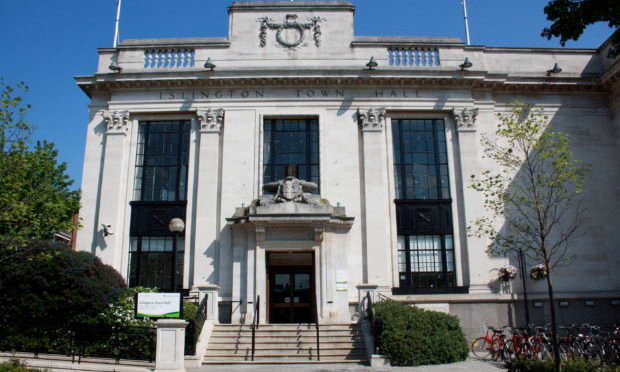Universal Credit claims continue to grow as Town Hall takes £52m Covid hit

Islington Town Hall. Photograph: Islington Council.
Universal credit claim numbers in Islington are continuing to rise as the economic impact of the pandemic unfolds.
The latest claims count, taken on 11 January, was 33,728 – a 158 per cent increase on the figure of 13,356 from March last year.
An update from Town Hall chief executive Linzi Roberts-Egan showed that 415 payments of £500 for self-isolation support for those unable to work and losing income have been made since the borough started the scheme in September 2020.
The £877,000 Covid winter grant is currently being distributed to residents to help with food and utility costs.
Roberts-Egan said: “The council continues to provide a robust response to the pandemic, despite the changing and uncertain landscape.
“[We] will continue to support the roll-out of the vaccination programme including taking proactive steps to address vaccination hesitancy within the community.
“As the borough tentatively moves out of lockdown, the council will continue to support residents and staff accordingly.”
According to the latest budget monitoring forecast for 2020/21, the council itself faces a total Covid-related budget pressure of around £52 million, made up of £16 million in additional costs and £36 million in income losses.
Grant funding from the government set against this amounts to £26m, with the Town Hall assuming it will receive compensation of £16m from Whitehall’s sales, fees and charges loss scheme and £2m from the tax guarantee scheme for Collection Fund losses.
It leaves a net Covid-related funding gap of approximately £8m in the current financial year.
Roberts-Egan added: “Rather than a one-off event that the council’s budget is recovering from, it is expected that Covid will continue to have a significant, currently unquantifiable, impact on the council’s medium-term budget over and above the amount covered by the Government’s Covid support package announced to date.
“For example, the Covid support package provides no funding for business rates income losses in 2021/22 and only provides support for sales, fees and charges income losses up until June 2021.
“Therefore, it is essential that the council has sufficient annual contingency budget and reserves to boost financial resilience and protect residents.”
Roberts-Egan revealed that on average, 80 per cent of critical services reported performing as normal in the first two weeks of February.
Meanwhile for non-critical services, 62 per cent report performing as normal over the same period.
As the Town Hall works to support the health system during the vaccine roll-out, pop-up jab sites in trusted community locations are being considered along with the mass vaccination hub at the Business Design Centre, with Finsbury Park Mosque in the frame for the first of these locations.
In the week commencing 8 February 2021, 2,817 tests were undertaken at the Lateral Flow Testing (LFT) sites in Islington, and since testing started, 18,766 tests have been undertaken in the borough.
Work is now underway to plan for how the PCR symptomatic testing sites at the Sobell Centre car park and Finsbury Leisure Centre along with LFT sites at The Vibast, The Arsenal Community Hub, Islington Assembly Hall and St Luke’s Church will manage an uptick in demand as lockdown eases and more businesses reopen.
According to the most recent update, Islington saw 156 new cases of coronavirus from 8-14 February, a drop from 288 the week before.
The rate per 100,000 people of weekly cases also dropped in the same period from 118.8 to 64.3 across all age groups, along with the rate of positive tests from 7.3 per cent to 4.1 per cent.
The latest data shows 17 deaths in the borough with Covid mentioned on the death certificate, the same as the previous week. There were eight more deaths overall seen this week compared to the 2015-19 average for the same week.
